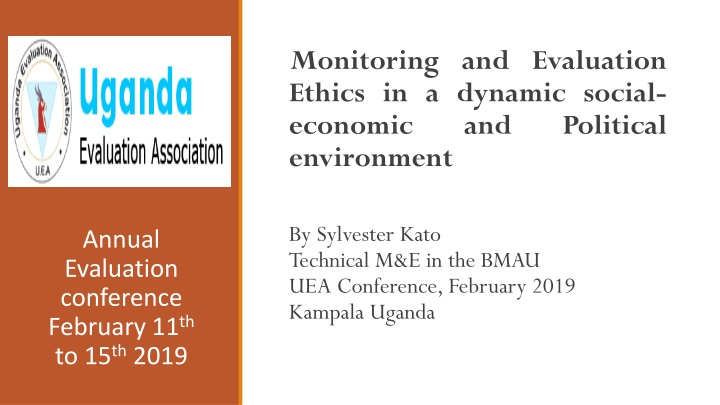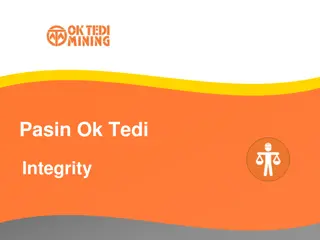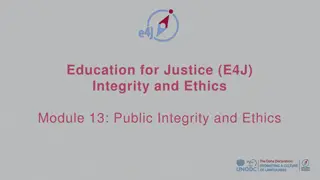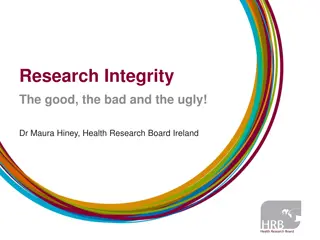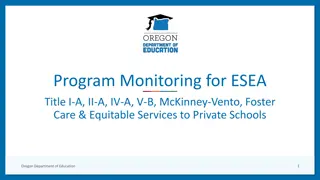Ethics in Monitoring and Evaluation: Ensuring Integrity in Development Practices
This paper discusses the ethical considerations in monitoring and evaluation processes, highlighting the importance of upholding moral principles and values in research conducted by development agencies. It emphasizes the need for adherence to ethical guidelines, particularly in dynamic social, economic, and environmental contexts. The significance of ethical standards, as outlined by the Uganda Evaluation Association, is explored, with a focus on promoting fairness, accountability, and the protection of human participants. The rationale for addressing ethical, moral, and political issues in research practices in developing countries is also examined to mitigate trust and power imbalances.
Download Presentation

Please find below an Image/Link to download the presentation.
The content on the website is provided AS IS for your information and personal use only. It may not be sold, licensed, or shared on other websites without obtaining consent from the author.If you encounter any issues during the download, it is possible that the publisher has removed the file from their server.
You are allowed to download the files provided on this website for personal or commercial use, subject to the condition that they are used lawfully. All files are the property of their respective owners.
The content on the website is provided AS IS for your information and personal use only. It may not be sold, licensed, or shared on other websites without obtaining consent from the author.
E N D
Presentation Transcript
Monitoring and Evaluation Ethics in a dynamic social- economic and environment Political By Sylvester Kato Technical M&E in the BMAU UEA Conference, February 2019 Kampala Uganda Annual Evaluation conference February 11th to 15th2019
Presentation outline Introduction Rationale for the paper Methodology Findings Conclusion Recommendations
Evaluation is a type of applied research commonly undertaken by development agencies for the systematic, objective assessment of an ongoing or completed project, and or before commencement of project, program or policy. The ethical considerations for evaluations (that involve human participants) are the same as for other kinds of research. Introduction Introduction Ethics is a branch of philosophy that is concerned with the moral principles and values, which govern our beliefs, actions and decisions. These can be understood as well based standards of right and wrong that prescribe what humans ought to do, usually in terms of rights, obligations, benefits to society, fairness, or specific virtues. Ethical guidelines are not about a list of do s and don ts , as the types of ethical considerations will vary depending on the research methods and context.
Introduction cont.. Introduction cont.. In all areas of their work, Uganda Evaluation Association (UEA) members, through their signatory status to the AFREA standards, are encouraged to observe the highest ethical standards. The Ugandan Evaluation Association identifies a set of ethical guidelines to which all evaluations in Uganda or conducted by Ugandan organisations is expected to adhere. The Uganda Evaluation Standards, developed and endorsed by evaluators in Uganda for the first time in 2013, provide guidance on how evaluation professionals and users should behave, what concepts and practices evaluators should use, the benchmarks their products should meet, and the outcomes they should achieve.
Introduction cont.. Introduction cont..
Rationale for the paper Research/evaluations conducted in developing countries and particularly in relation to development practice raises distinct ethical, moral and political issues and dilemmas. These arise due to current and historical disparities in wealth, power, and access to information, political interest, and status. The potential for trust and power imbalances between researchers/evaluators and participants is heightened (particularly when evaluation is linked to aid policy and program decisions) and unintended negative consequences are a potential outcome. It s against this backdrop that discussion on ethical principles is comprehensively done among different Evaluation professionals as part of the strategies to nurture and train emerging evaluators on how to deal with this dilemma.
Rationale for the paper cont The purpose of these guidelines, principles or standards is to generate discourse with evaluators on the understanding and application of principles of ethical research or evaluation conduct. They are intended as an educative tool to support and advance ethical research practice. Given the diversity and range of evaluation studies conducted by the UEA members and other international evaluators expected to attend the conference, this document provides a starting point for advice and resources. The document is intended for researchers, evaluators and practitioners within the UEA membership and beyond to assist with planning, commissioning and conducting ethical research
Methodology The paper adopted document review to decipher some of the key ethical principles that are expected to guide the evaluations. Some of the documents reviewed included the UEA evaluation standards(2013), the Australian Code for the Responsible Conduct of Research (2007), National Statement on Ethical Conduct in Human Research (2007) and Values and Ethics: Guidelines for Ethical Conduct in Aboriginal and Torres Strait Islander Health Research (2003). These documents specify the standards expected in the responsible conduct of research in Australia and Uganda, and are aligned with international agreements such as the Declaration of Helsinki and international human rights instruments.
Methodology cont Beyond these sources, this document also draws on literature on ethics in cross-cultural research, professional codes for evaluation and ethical guidelines for research or evaluation developed by Australian aid and development non-governmental agencies working in developing countries. The principles presented in this document build upon the UEA Code of Conduct, which exists to assist UEA members to carry out evaluations with an ethical lens that is universally accepted by the members of the evaluation association.
Findings Fundamentally, principles are about the relationship between researchers (those who conduct, fund and commission research or evaluations) and research participants. ethical research/evaluation The expression to the values underscored in the UEA standards and underpinning ethical research and evaluation: following principles give practical four core values
Four core values underpinning ethical Four core values underpinning ethical research and evaluation: research and evaluation: Respect for human beings Respect is an overarching consideration and represents recognition of each human being s intrinsic value. As such, making opportunity for human beings to exercise autonomy and make their own decisions is paramount, as is a commitment to participant welfare over and above research goals. Respect requires prior knowledge of and due regard for the culture, values, customs, beliefs and practices, both individual and collective, of those involved in research. Informed consent means a participant is given clear information about the research, is able to choose not to participate and is able to withdraw at any time, without consequence (any limits to this right should be explained).
Four core values underpinning ethical Four core values underpinning ethical research and evaluation: research and evaluation: Beneficence Beneficence is action that is done for the benefit of others. This principle implies that the expected benefit to participants or the wider community justifies any risks of harm or discomfort to participants. To fulfil this principle research must be of value to participants, their community, country or development practice more broadly, be designed to minimise risks and participants must be duly informed of potential benefits and risks of the research. Beyond beneficence, the concept of do no harm (non-maleficence) is also critical, particularly in fragile states. There are many types of harm that require anticipation and consideration. To do no harm means such risks and harm are anticipated, planned for, and used to seriously question proceeding with proposed research. Beyond harm to participants, this principle also requires consideration of potential harm to researchers themselves, particularly in terms of safety, potential trauma, culture shock and availability of emotional support.
Four core values underpinning ethical Four core values underpinning ethical research and evaluation: research and evaluation: Research merit and integrity Research deemed to have merit is well-justified, meets relevant quality criteria and is conducted by persons or teams with sufficient experience and competence. Beyond the relevant research skills, a competent research team requires as a minimum a foundational knowledge of the culture, political situation, history and values in the relevant country and local context. Inclusion of adequately experienced local researchers with appropriate language and cultural understanding may improve research integrity and offer opportunity to build research capacity in developing countries. Research integrity is secured by researcher (and research funder or commissioner) commitment to genuine search for knowledge and understanding, following recognised principles of honest research conduct.
Four core values underpinning ethical Four core values underpinning ethical research and evaluation: research and evaluation: Justice This principle is generally described in relation to equity: a fair process for recruitment of research participants; no unfair burden of participation on particular groups; and fair distribution of and access to the benefits of participation in research. Justice also takes in the recognition that there should be no exploitation of participants in the conduct of research, and instead, active protection of participant wellbeing. In developing countries this principle involves treating all participants with dignity, regardless of gender, age, race, ethnicity, ability, religion and culture, and requires researcher cognisance of existing power relations, so that broader principles of human rights and addressing injustice can be upheld. It also involves ensuring that all relevant social groups are actively included in research and that attempts are made to avoid further marginalisation, discrimination and exclusion of under-represented social groups.
Care for evaluation participants This section discusses considerations and processes related to participant rights and safety that will need to be addressed throughout the research process, including issues of privacy and confidentiality, as well as informed consent, with particular guidance for informed consent with children.
Care for evaluation participants Privacy and confidentiality Research participants should have the right to remain anonymous and to have their rights to privacy and confidentiality respected. Researchers should be aware that preserving anonymity requires that there be no link between the data (responses) and the source (the participant), and in some cases this might be impossible since characteristics of the participant may identify them. In such cases it may be possible for researchers to take care that information is sufficiently aggregated or with sufficient details changed so that no community, household or individual can be identified. If there are any limits to confidentiality (for instance, mandatory disclosure of cases of abuse) then these limits should be made clear to participants during the consent process. Privacy also requires that researchers take responsibility for data to be stored securely with access limited to designated, authorised people. Ethical questions regarding knowledge generation, ownership and related rights of participants should be considered, as should the potential value of the material for further research.
Care for evaluation participants Informed consent Informed consent is one of the basic minimum requirements that must be addressed to ensure that ethical research principles are upheld. Informed consent should be considered at the beginning and throughout the research process, especially in longer initiatives. Specific procedures and considerations should be observed in the case of particular groups such as children and young people, and people with disabilities and are described in the subsections below. The core idea is that a participant agreeing to take part in research should do so voluntarily, without coercion and with sufficient understanding of the research procedures, potential risks and potential benefits. Informed consent serves to support this process. Such consent does not absolve the researcher from protecting participants.
Care for evaluation participants Informed consent for children and young people Before including a child or young person in research, researchers must firstly ensure that participation is not contrary to that child s or young person s best interest, and maintain alignment with any relevant Child Protection Policy and the UN Convention of the Rights of the Child (1989). Informed consent raises particular challenges when research involves children and young people, arising from some concerns such as: Children s or young people s capacity to understand what the research involves, and therefore whether their consent to participate is sufficient Possible coercion of children or young people by parents, peers, researchers or others to participate
Care for evaluation participants Informed consent for people with a disability People with a disability are entitled to full and equitable participation in research as outlined in the UN Convention on the Rights of Persons with Disabilities. This includes people with a cognitive impairment, intellectual disability or a mental illness. Many people with disability will have full capacity to participate in research and should not be deemed to be of high risk solely due to their disability. The impact of a disability is often dependent on environmental barriers; hence researchers should be cognisant to ensure that research processes are inclusive of people with disability and that their specific participation limitations are addressed.
Conclusion This paper has reviewed a significant body of literature, including ethics documentation and UEA standards, to generate discourse into the ethical dilemmas and solutions to ethical issues during collecting data, analysis, report writing and dissemination. Its findings indicate presence of a common related set of standards that can be domesticated to fit different evaluation societies. The broad ethical standards revolve around; Autonomy; Beneficence, Justice; and Research merit and integrity: - The other considerations for research participants are also observed to ensure equity and equality for all participants.
Recommendation All evaluation bodies should have well documented standards and ethical standards to increase shared understanding of the guiding principles of evaluation.
